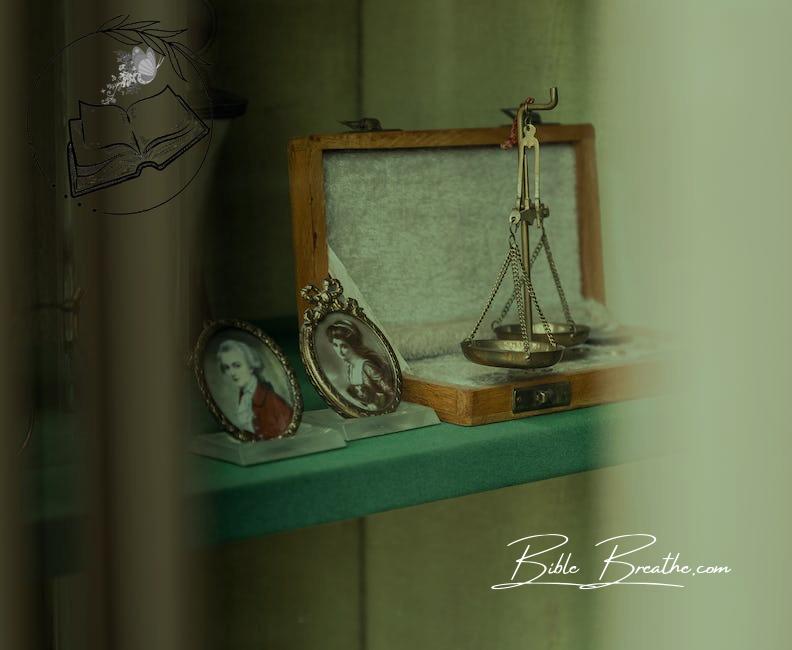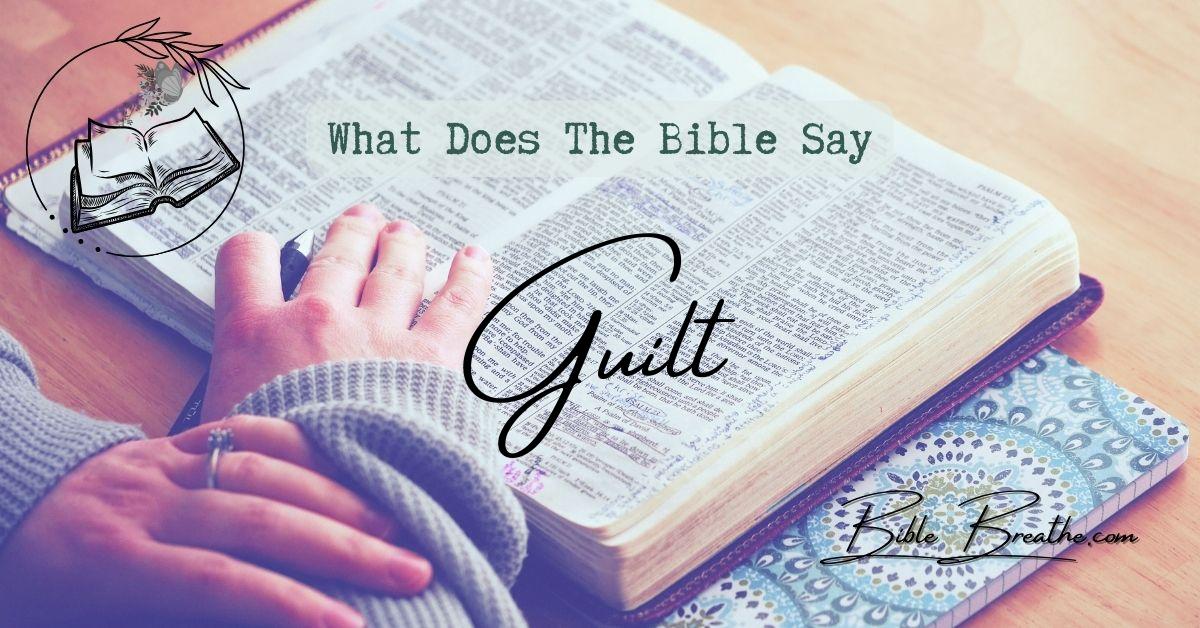What’s the deal with guilt, folks?
Guilt, that heavy load we’ve all carried, it’s like a backpack full of bricks, right?
Well, the Bible’s got something to say about it, and it’s not all doom and gloom.
Guilt, it’s like that feeling when you know you messed up big time.
But here’s the deal, it’s not just about feeling bad.
It’s about finding redemption and repentance.
Whether you’re a believer or not, this book’s got wisdom to share.
Remember Adam and Eve?
They tasted the forbidden fruit, and bam, guilt came knocking.
But it’s not the end of the story.
The Bible talks about two kinds of sorrow – worldly sorrow and godly sorrow, and how forgiveness and salvation can lift that weight.
We’ll dive deep into the sacrifice of Christ, and learn to tell the difference between false guilt and true guilt.
Let’s discover how the Bible offers hope, even in the darkest moments of condemnation.
It’s all about finding that justification, and that’s a message for all of us, young and old.
Let’s unpack it together.
📖🙌
Key Takeaways
-
Guilt is a universal human experience, often stemming from moral or ethical transgressions. The Bible acknowledges the reality of guilt and emphasizes the importance of addressing it in a healthy and redemptive manner.
-
The power of Christ’s sacrifice is a central theme in addressing guilt according to the Bible. Through His death and resurrection, Jesus provides a path for believers to find forgiveness and liberation from guilt. Accepting and believing in Jesus’ sacrifice is key to overcoming guilt and finding peace with God.
-
Recognizing and rejecting false guilt is crucial. False guilt may result from unreasonable expectations, societal pressures, or misinterpretations of religious teachings. The Bible encourages discernment to distinguish between guilt that aligns with God’s standards and guilt that is unfounded or detrimental to one’s well-being.
-
Embracing God’s mercy and forgiveness is vital for dealing with guilt. The Bible emphasizes that God is merciful and offers forgiveness to those who genuinely repent and seek reconciliation. This reassures believers that guilt does not have to define them, and they can find solace and freedom in God’s grace.
-
In summary, the Bible acknowledges the universal nature of guilt and provides a pathway to redemption through Christ’s sacrifice. It calls for discernment to reject false guilt and embrace God’s mercy and forgiveness. Understanding and applying these principles can help believers find freedom from guilt and live in alignment with God’s love and grace.
Unlocking the Weight of Guilt: What the Bible Reveals

Photo modified by BibleBreathe.com. Original photo by Büşra Ilıca on Pexels
Guilt, that heavy burden we’ve all carried on our shoulders at some point.
Let’s dig deep into the Bible to unearth the roots of this powerful emotion.
The Genesis of Guilt
Picture the Garden of Eden, a place where innocence and purity reigned supreme.
In this idyllic setting, a momentous event took place.
Adam and Eve, humanity’s first residents, stood at a crossroads between obedience and temptation.
But of the tree of the knowledge of good and evil, thou shalt not eat of it: for in the day that thou eatest thereof thou shalt surely die.” – Genesis 2:17 (KJV)
Yet, lured by curiosity and swayed by deception, they took a bite of the forbidden fruit.
Suddenly, their eyes were opened to the stark contrast between right and wrong.
Guilt slithered in like a stealthy serpent, their conscience bearing witness to their disobedience.
The Debut of Guilt in Human History
This fateful act marked the debut of guilt in human history.
Paradise lost its innocence, transforming into a world where the awareness of morality could bring forth the burden of guilt.
As we journey through the Bible, we encounter stories of guilt and its consequences.
But intertwined with these tales is a message of hope, redemption, and forgiveness.
The Bible provides a roadmap to absolution and inner peace, guiding us through the labyrinth of guilt.
Remember, guilt doesn’t have to be a permanent lodger in our hearts.
Through repentance, forgiveness, and the boundless love of Christ, we can break free from the chains of guilt.
As believers, we’re constantly reminded of the immense grace and mercy that God extends to us.
If we confess our sins, he is faithful and just to forgive us our sins, and to cleanse us from all unrighteousness.” – 1 John 1:9 (KJV)
In our journey of faith, let’s navigate the turbulent waters of guilt using God’s Word as our compass, finding solace in the warm embrace of divine forgiveness and justification.
Unraveling the Threads of Guilt

Photo modified by BibleBreathe.com. Original photo by Ron Lach on Pexels
Guilt, my friends, it’s like a riddle wrapped in an enigma, isn’t it?
It’s that feeling that creeps in when you’ve done something you know deep down isn’t right.
But let me tell you, it’s a bit like standing at a crossroads with two signposts.
One says “Repentance Avenue,” and the other, “Despair Boulevard.”
The Dual Nature of Guilt
Now, let me break it down for you.
Guilt comes in two flavors: feeling guilty and being guilty.
It’s like watching a thunderstorm from the safety of your cozy home versus getting caught in the pouring rain.
Feeling guilty is when you’re in your comfort zone, realizing you might have messed up.
Being guilty is like stepping out into the storm, facing the consequences of your actions head-on.
“For godly sorrow worketh repentance to salvation not to be repented of: but the sorrow of the world worketh death.” – 2 Corinthians 7:10 (KJV)
Choosing the Path
When guilt comes knocking, you’ve got a choice to make.
It’s like being at a fork in the road.
You can let it lead you down the path of repentance, where you own up to your mistakes, seek forgiveness, and make a U-turn toward righteousness.
Or, you can let it push you further away from God, getting lost in a thicket of shame and despair.
If we confess our sins, he is faithful and just to forgive us our sins, and to cleanse us from all unrighteousness.” – 1 John 1:9 (KJV)
Redemption in Christ
But here’s the beautiful part, my friends.
In the grand tapestry of faith, guilt plays a crucial role.
It’s the reminder that we’re not perfect, but through Christ’s sacrifice, we find redemption.
Guilt can be your compass, guiding you towards seeking redemption, understanding the profound depth of Christ’s sacrifice, and embracing His boundless forgiveness.
Guilt, when handled right, becomes a stepping stone for transformation, a divine call to align with your moral compass, and an invitation to dive headfirst into the ocean of God’s mercy and grace.
*Take a deeper dive into the Bible’s wisdom on guilt, redemption, and the intricate nature of this emotion.
Learn to distinguish between worldly sorrow and godly sorrow, and discover how guilt can be your bridge to salvation and a richer relationship with the Almighty.*
Guilt Explored: Worldly vs. Godly Perspectives

Photo modified by BibleBreathe.com. Original photo by Brett Jordan on Pexels
In the vast realm of guilt, we encounter two distinctive realms—the chains of worldly sorrow and the liberation of godly remorse.
Grasping Worldly Sorrow and Its Consequences
Worldly sorrow crashes over us like a turbulent sea when we confront our wrongdoings.
It’s that gnawing regret that haunts us when our actions bring about painful consequences.
In the Bible, we witness the story of Judas Iscariot, who, after betraying Jesus, was engulfed in this very form of sorrow.
Then Judas, which had betrayed him, when he saw that he was condemned, repented himself, and brought again the thirty pieces of silver…” – Matthew 27:3 (KJV)
However, this sorrow didn’t lead to redemption or hope for Judas.
Instead, it spiraled into hopelessness, ultimately driving him to a tragic end.
Worldly guilt often traps us in a never-ending cycle of self-condemnation, leaving us unable to break free.
Embracing the Hope and Redemption of Godly Sorrow
Now, in stark contrast, there is godly sorrow—a beacon of light amid the darkness of guilt.
It’s a sorrow that goes beyond regretting the consequences of our actions; it’s a deep remorse for having offended God.
It paves the way for repentance and, ultimately, redemption.
“For godly sorrow worketh repentance to salvation not to be repented of: but the sorrow of the world worketh death.” – 2 Corinthians 7:10 (KJV)
When we embrace godly sorrow, we seek forgiveness and turn toward the path of righteousness.
It acknowledges our shortcomings but is also coupled with the assurance of God’s mercy and grace.
This sorrow transforms us, leading us into the embrace of the sacrificial love of Christ.
In this understanding, we break free from the clutches of guilt, the chains shattering as we step into the loving embrace of God.
Believers are promised salvation and justification, erasing the stains of guilt and paving the path to righteousness.
Let us choose the sorrow that leads to hope, a sorrow that guides us toward the outstretched arms of God, offering redemption and a chance to start anew.
Guilt: From Darkness to Redemption

Photo modified by BibleBreathe.com. Original photo by Ron Lach on Pexels
Friends, let’s talk about guilt – that heavy backpack we sometimes carry on our life’s journey.
It’s like a lantern in the vast cave of faith, lighting the way for both those finding their path and those who’ve already embarked on their journey.
The Burden on Unbelievers
For those yet to embrace God’s truth, guilt can be a real anchor dragging them down.
It’s the consequence of our missteps, a nagging reminder of straying from the righteous road.
Unbelievers wrestle with this guilt, often leading to a kind of sorrow that doesn’t lead to transformation.
For all have sinned, and come short of the glory of God.” – Romans 3:23 (KJV)
The Redemption Tale
Now, here’s where the good news kicks in – the Gospel is all about redemption.
It’s a path, a way to shed the weight of guilt, whether you’re a believer or an unbeliever.
Through Christ’s sacrifice, redemption is within reach.
His sacrifice on the cross stands as a testament to God’s love and mercy, opening the door for all to find forgiveness and redemption.
“In whom we have redemption through his blood, the forgiveness of sins, according to the riches of his grace.” – Ephesians 1:7 (KJV)
Assurance for Believers
Now, for those who’ve welcomed Christ into their lives, they carry a different kind of load.
It’s not the heavy guilt of condemnation but a weight that propels them towards righteousness.
Yes, they might stumble and feel guilt, but they hold the assurance of forgiveness through repentance.
“There is therefore now no condemnation to them which are in Christ Jesus, who walk not after the flesh, but after the Spirit.” – Romans 8:1 (KJV)
The Journey of Transformation
In this grand journey of life and faith, guilt serves as a compass.
It points unbelievers towards the radiance of redemption and guides believers deeper into the grace of God.
It’s like a lighthouse, showing the way from darkness to light, from guilt to forgiveness, from worldly sorrow to godly sorrow.
So, my friends, embrace this journey, let guilt be your guide, and take refuge in the boundless love and mercy of our Savior.
In the realm of faith, remember, guilt isn’t a shackle; it’s a reminder of the limitless grace of our Heavenly Father.
Breaking the Illusion of False Guilt: Finding Freedom

Photo modified by BibleBreathe.com. Original photo by Andres Ayrton on Pexels
In the labyrinth of guilt, a dangerous illusion emerges—false guilt, a deceptive mirage that ensnares and bewilders.
The Battle Against Lingering Guilt, Even After Forgiveness
Imagine this scenario: a forgiven soul, yet bound by the chains of phantom guilt that refuse to let go.
False guilt whispers deceitful tales, casting shadows of doubt upon the sincerity of forgiveness.
It’s a struggle familiar to many, a lingering fog that obscures the light of absolution.
“There is therefore now no condemnation to them which are in Christ Jesus, who walk not after the flesh, but after the Spirit.” – Romans 8:1 (KJV)
The truth is, once forgiven, we are cleansed, and the guilt we carry is false—an illusion that seeks to steal away the peace that forgiveness brings.
The Deception of Satan and the Snare of False Humility
False guilt is a tool cunningly wielded by the adversary.
Satan, the master of deception, whispers doubts into our ears, sowing seeds of counterfeit humility.
It’s a trap, masked as remorse, steering us away from the victory of the cross.
In such moments, we must remind ourselves of the sacrifice of Christ, a sacrifice that nullifies any true guilt and leaves no room for the chains of the false.
We must discern the lies, recognize the truth, and cling to the promises of salvation.
For by grace are ye saved through faith; and that not of yourselves: it is the gift of God.” – Ephesians 2:8 (KJV)
Through faith, we can differentiate between genuine guilt, which leads to repentance and transformation, and false guilt, a mere illusion.
Let not the chains of false guilt bind us; instead, let us stand steadfast in the freedom of God’s grace and mercy.
As believers, we’re called to embrace the liberty offered by Christ’s sacrifice and silence the deceitful whispers of false guilt.
In the realm of grace, false guilt holds no sway, and our hearts can rest in the assurance of redemption.
Guilt: Your Spiritual Compass

Photo modified by BibleBreathe.com. Original photo by Ron Lach on Pexels
Guilt, my friends, is like a compass in the vast terrain of human emotions.
And within this compass, true guilt shines as the North Star, always pointing us in the right direction, especially when it comes to matters of the soul and faith.
The Awakening Power of True Guilt
True guilt is that profound stirring within, a realization that we’ve veered off the moral highway.
It’s like a gentle tap on the doors of our conscience, reminding us to reflect on our deeds.
This guilt, my friends, is a divine gift.
It nudges us closer to God, awakening the need for repentance and redemption.
“For I will declare mine iniquity; I will be sorry for my sin.” – Psalm 38:18 (KJV)
Sorting the Wheat from the Chaff: True vs. False Guilt
It’s crucial, my friends, to distinguish between true guilt and its crafty cousin, false guilt.
False guilt, you see, is a jailer.
It locks us in, spiraling us down a pit of self-condemnation and despair.
It often stems from societal pressures or unrealistic expectations.
But true guilt, well, it liberates.
It’s a call to make things right, to seek forgiveness, and to rediscover our true purpose.
“If we say that we have no sin, we deceive ourselves, and the truth is not in us.” – 1 John 1:8 (KJV)
A Road to Redemption
When we embrace true guilt and channel it in a positive way, it becomes a road to redemption.
It’s through this guilt that we recognize our need for a Savior, our need for forgiveness and transformation.
It’s a humble acknowledgment of our humanity, acknowledging our flaws yet believing in our capacity to rise through the grace of God.
“Create in me a clean heart, O God; and renew a right spirit within me.” – Psalm 51:10 (KJV)
Embrace the Guiding Light of Guilt
In the realm of spirituality, my friends, true guilt is not the enemy but the guide.
It points us toward repentance, toward a deeper connection with God.
So, embrace it.
In its truest form, guilt can be a potent catalyst for spiritual growth, leading us toward the loving embrace of divine forgiveness and grace.
*Let true guilt be your compass, guiding you toward the light of repentance and redemption.
For in acknowledging our wrongs, we find the strength to transform and the grace to walk in the path of righteousness.*
Embracing True Freedom: Christ’s Atonement and Liberation from Guilt

Photo modified by BibleBreathe.com. Original photo by Kourosh Qaffari on Pexels
Amidst the shadows of guilt, a ray of hope emerges—the transformative power of Christ’s sacrifice, offering liberation and a life unburdened.
The Profound Impact of Christ’s Sacrifice on Guilt
In the grand tapestry of divine love and redemption, Christ’s sacrifice takes center stage.
The cross, once an instrument of suffering, transformed into the source of grace and forgiveness for all humanity.
For God so loved the world, that he gave his only begotten Son, that whosoever believeth in him should not perish, but have everlasting life.” – John 3:16 (KJV)
Through His sacrifice, Christ bore the weight of our guilt, extending redemption and the opportunity for a fresh start.
The blood shed on Calvary’s hill didn’t just cleanse our sins but also washed away the guilt clinging to our souls.
Embracing the Light and Living Guilt-Free
In the wake of this glorious sacrifice, we are called to step into the light, to walk a path unburdened by guilt.
Christ’s sacrifice invites us to a life of righteousness and freedom, breaking the chains of condemnation.
If we say that we have fellowship with him, and walk in darkness, we lie, and do not the truth: But if we walk in the light, as he is in the light, we have fellowship one with another, and the blood of Jesus Christ his Son cleanseth us from all sin.” – 1 John 1:6-7 (KJV)
Living in this light means living in the freedom Christ has granted us.
It’s an invitation to rise above guilt, to transcend the past, and to embrace the promise of salvation and justification.
As believers, let us rejoice in this newfound freedom, allowing the radiant love of Christ’s sacrifice to dispel the remnants of guilt.
In His love, we find redemption, in His grace, we discover peace, and in His sacrifice, we attain ultimate freedom.
Frequently Asked Questions (FAQs) About What Does The Bible Say About Guilt
What is the difference between feeling guilty and being guilty?
Feeling guilty involves emotions and conscience, while being guilty means being responsible for an actual offense.
It’s essential to distinguish between these for a healthy sense of remorse and accountability.
How can one differentiate between worldly and godly guilt?
Worldly guilt often arises from societal or personal expectations, while godly guilt stems from a sense of wrongdoing against God’s moral standards.
Worldly guilt may be driven by external pressures, while godly guilt is rooted in one’s relationship with God and a recognition of moral transgressions.
Discernment and prayer can help differentiate between the two.
What does the Bible say about overcoming feelings of guilt?
The Bible advises seeking repentance and forgiveness when burdened by guilt.
1 John 1:9 assures that confessing our sins allows God to forgive and cleanse us, alleviating guilt.
Embracing God’s mercy and understanding Christ’s atoning sacrifice is pivotal in finding solace and relief from guilt.

